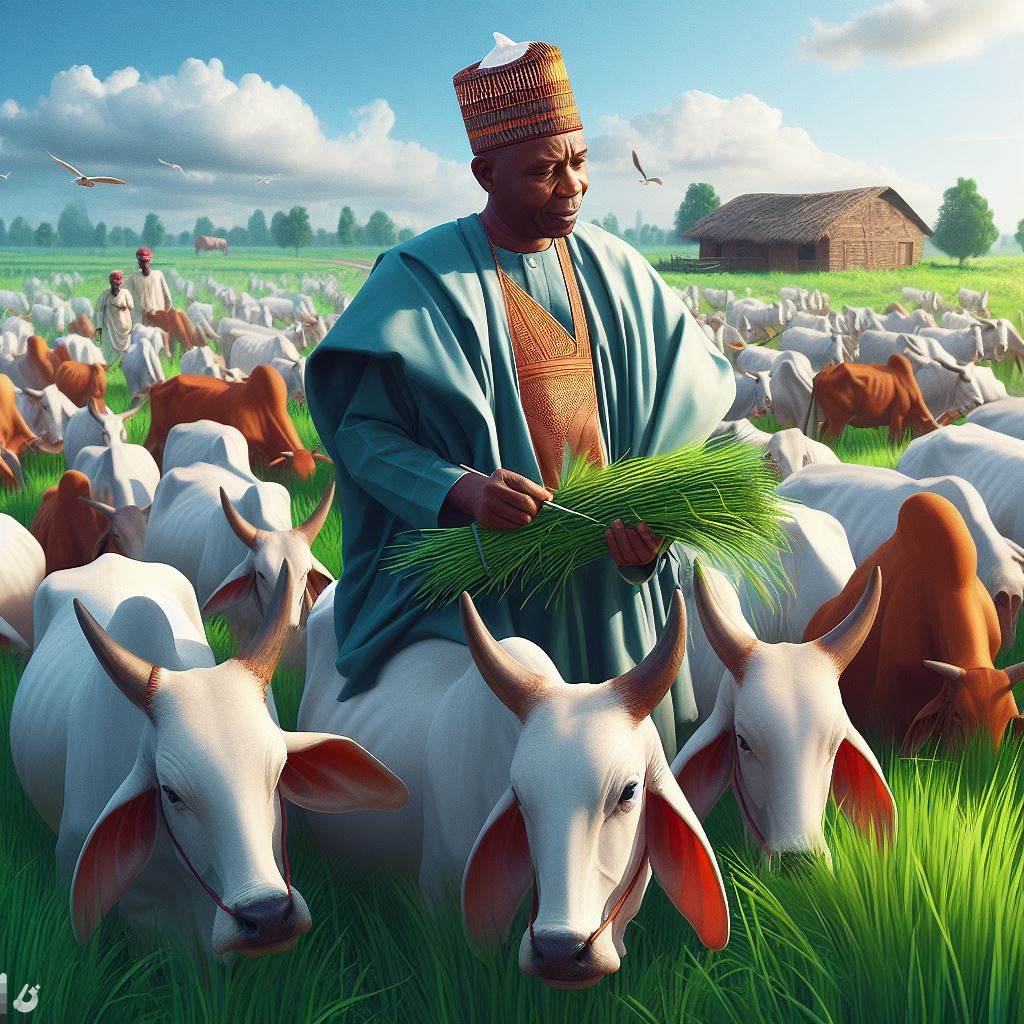Introduction
Government policies have a profound impact on the state of animal health education in Nigeria.
These policies provide a framework for the establishment and implementation of programs and initiatives aimed at enhancing animal welfare and public health.
Animal health education is crucial as it helps to improve the understanding of proper animal care and management practices among individuals and communities.
It promotes responsible pet ownership, disease prevention, and the identification and treatment of illnesses.
Moreover, it helps to prevent zoonotic diseases, which are illnesses that can be transmitted between animals and humans.
In light of these factors, it is important to evaluate the government policies on animal health education in Nigeria.
These policies should prioritize the provision of comprehensive information and resources on animal care and management.
They should also support the implementation of educational programs in schools, communities, and veterinary clinics.
Through this analysis, recommendations can be made on how to improve the existing policies and ensure their effective implementation.
This is necessary to ensure that animal health education becomes more accessible and widespread across the country.
In fact, government policies on animal health education play a significant role in shaping the state of animal welfare and public health in Nigeria.
By understanding these policies and advocating for their improvement, we can work towards a society where animals are treated with care and where public health is safeguarded.
Overview of animal health education in Nigeria
In Nigeria, there is a need to focus on animal health education in order to ensure the well-being of both animals and humans.
Animal health education refers to the process of imparting knowledge and skills necessary for the prevention and control of diseases in animals.
This section will provide an overview of the current state of animal health education in Nigeria and discuss the challenges faced in implementing animal health education programs.
Current state of animal health education
The current state of animal health education in Nigeria is inadequate, with limited access to quality educational resources and training programs for individuals interested in animal health.
There is a lack of formal curriculum for animal health education in schools and universities, leading to a dearth of qualified professionals in the field.
Furthermore, there is a limited awareness and understanding of the importance of animal health among the general population.
This lack of awareness can have dire consequences for both animals and humans, as it hinders the detection and prevention of disease outbreaks.
To address these issues, there is a need for the Nigerian government to prioritize animal health education and allocate resources towards the development of comprehensive educational programs.
This includes the establishment of dedicated veterinary schools and colleges, as well as the integration of animal health topics into existing educational institutions.
Challenges faced in implementing animal health education programs
Implementing animal health education programs in Nigeria comes with its fair share of challenges.
One major challenge is the lack of funding and resources allocated to the development and maintenance of educational programs.
In addition, there is a shortage of qualified instructors and trainers who can effectively teach animal health topics.
This shortage of qualified personnel hampers the quality and effectiveness of animal health education in the country.
Furthermore, infrastructure limitations, such as a lack of laboratories and research facilities, make it difficult to provide hands-on training and practical experience to students.
This hinders the development of practical skills necessary for dealing with animal health issues.
Another challenge is the lack of coordination and collaboration between different government agencies and stakeholders involved in animal health education.
This leads to a fragmented approach, with limited sharing of resources, knowledge, and best practices.
Despite these challenges, there have been efforts by non-governmental organizations and international agencies to support animal health education in Nigeria.
These efforts include providing scholarships, training programs, and advocacy for the inclusion of animal health education in the national curriculum.
In short, while there is a need for greater emphasis on animal health education in Nigeria, there are challenges that need to be addressed.
Improved funding, qualified instructors, infrastructure development, and better coordination between stakeholders are necessary to ensure the success of animal health education programs.
Only through these efforts can Nigeria develop a workforce equipped with the necessary knowledge and skills to safeguard the health and well-being of animals and humans alike.
Government Policies on Animal Health Education in Nigeria
Description of Existing Policies
- The government of Nigeria has implemented policies to promote animal health education.
- These policies aim to improve awareness about animal diseases and their prevention.
- The policies focus on educating livestock farmers, veterinary professionals, and the general public.
- Government agencies collaborate with educational institutions and NGOs to implement these policies.
- Training programs and workshops are organized to enhance knowledge and skills in animal health.
Evaluation of the Effectiveness of these Policies
- The effectiveness of government policies on animal health education in Nigeria has been mixed.
- While there have been notable improvements, challenges like limited resources and inadequate infrastructure persist.
- Some regions have seen a decline in certain animal diseases due to increased awareness and vaccination.
- However, the reach of these policies remains limited, especially in rural areas with poor access to education and healthcare facilities.
- There is a need for continuous evaluation and adaptation of policies to address emerging challenges.
Examples of Successful Implementation of Animal Health Education Programs
- The “One Health Initiative” launched by the Nigerian government aims to improve collaboration between human and animal health sectors.
- This initiative promotes integrated approaches to disease prevention and control.
- It emphasizes the importance of animal health education in preventing zoonotic diseases.
- The establishment of veterinary schools and colleges in different regions has played a crucial role in improving animal health education.
- Mobile veterinary clinics have been set up in remote areas, providing veterinary care and education to farmers.
In essence, the government of Nigeria has taken steps to promote animal health education through various policies.
While there have been successes in raising awareness and reducing certain animal diseases, challenges such as limited resources and unequal access to educational opportunities remain.
The “One Health Initiative” and the establishment of veterinary schools have been notable efforts in improving animal health education.
However, continuous evaluation and adaptation of policies are necessary to address the evolving needs of the sector.
Collaborative efforts between government agencies, educational institutions, and NGOs are crucial in ensuring the effectiveness and sustainability of these policies.
Read: The Role of Agronomy in Nigeria’s Food Security Vision
Transform Your Career with Expert Guidance
Get personalized mentorship consulting that’s tailored to your unique path. Our expert advice is actionable and exclusive.
Get Started
Impact of government policies on animal health education
Improvement in livestock health
- Government policies on animal health education have led to significant improvements in livestock health.
- By providing education and training for farmers, the government ensures that they can properly care for their animals.
- Farmers are taught about proper nutrition, disease prevention, and vaccination programs for their livestock.
- This knowledge helps in reducing the mortality rate among animals and improves their overall health.
- As a result of improved livestock health, farmers can produce better quality products for the market.
Economic benefits for farmers
- Government policies on animal health education also bring economic benefits for farmers.
- With better knowledge and skills, farmers can identify and treat diseases at an early stage, reducing the need for expensive veterinary services.
- This saves farmers money and increases their profitability.
- By learning about animal health, farmers can also prevent the spread of diseases among their livestock, avoiding economic losses.
- When animals are healthy, they are more productive and can contribute to the farmer’s income.
Contribution to food security
- Government policies on animal health education play a vital role in ensuring food security.
- When livestock are healthy, they can produce more milk, eggs, or meat, contributing to the availability of food.
- By educating farmers on proper animal health practices, the government helps in increasing the quantity and quality of animal-based products.
- This, in turn, contributes to meeting the nutritional needs of the population and reducing food scarcity.
- Animal health education also includes information on food safety, ensuring that consumers have access to safe and high-quality animal products.
Basically, government policies on animal health education in Nigeria have a positive impact on various aspects.
These policies have led to improvements in livestock health, benefiting farmers economically and contributing to food security in the country.
By providing education and training, the government equips farmers with the necessary skills and knowledge to care for their animals properly.
This not only reduces the mortality rate among animals but also enables farmers to produce better quality products for the market.
Additionally, the economic benefits of animal health education, such as cost savings and increased profitability, further support farmers in their livelihoods.
Lastly, by ensuring food security through healthy livestock and safe animal products, the government ensures the well-being of the population.
Read: Case Studies: Successful Animal Production in Nigeria
Challenges and Limitations of Government Policies
Insufficient Funding and Resources
Government policies on animal health education in Nigeria encounter a significant hurdle—insufficient funding and resources.
Budgetary allocations often fall short, hindering comprehensive program implementation.
Funds earmarked for awareness campaigns, workshops, and training sessions are inadequate.
Consequently, the outreach efforts struggle to cover the expansive rural areas where communities heavily depend on animal husbandry.
The scarcity of resources further impedes the establishment of veterinary clinics and educational institutions, limiting the overall impact of the policies.
Active initiatives require substantial financial backing to address the diverse needs of Nigeria’s vast agricultural landscape.
Lack of Coordination and Collaboration
Another pressing challenge is the lack of coordination and collaboration among relevant stakeholders.
Government bodies, non-governmental organizations, and local communities often operate in silos, leading to fragmented efforts in animal health education.
Effective policies necessitate seamless coordination to ensure a unified approach.
The absence of collaborative frameworks results in redundant activities and undermines the potential synergies that could amplify the impact of educational initiatives.
Stakeholders must synchronize their efforts, share resources, and pool expertise to create a cohesive strategy that addresses the multifaceted aspects of animal health education.
Cultural and Societal Barriers
Cultural and societal barriers pose intricate challenges to the implementation of government policies on animal health education.
Deep-rooted traditions and beliefs sometimes clash with modern veterinary practices.
Communities may resist adopting new techniques or preventive measures due to cultural norms.
Overcoming these barriers requires culturally sensitive approaches that integrate traditional practices with contemporary knowledge.
Moreover, societal attitudes toward animals may hinder effective implementation.
Shifting perceptions requires targeted awareness campaigns to bridge the gap between cultural values and the evolving landscape of animal health.
Essentially, the challenges of insufficient funding, coordination issues, and cultural barriers demand strategic interventions for the successful implementation of government policies on animal health education in Nigeria.
Addressing these limitations is pivotal for fostering a sustainable and harmonious coexistence between communities and their animal counterparts.
Read: Agronomy Field Practices: Realities in Nigerian Terrain
Recommendations for enhancing government policies on animal health education
Increased budget allocation for education programs
Implementing these recommendations will contribute to improving the overall state of animal health education in Nigeria.
Increased budget allocation for education programs is crucial as it will provide the necessary financial support to develop and implement comprehensive animal health education initiatives.
In turn, this will lead to well-trained veterinary professionals and educators who can effectively educate the public and address animal health concerns.
Strengthening partnerships with relevant stakeholders
Strengthening partnerships with relevant stakeholders, such as veterinary associations, universities, and research institutions, is essential for the success of animal health education programs.
Collaborating with these organizations will ensure the availability of resources, share expertise, and foster the development of standardized curricula and training materials.
This collaborative approach will contribute to the overall effectiveness and sustainability of animal health education initiatives.
Raising public awareness on the importance of animal health education
Raising public awareness about the importance of animal health education is crucial for encouraging responsible pet ownership and promoting animal welfare.
Government-led awareness campaigns can educate the general public on the benefits of proper animal care, including prevention of diseases and zoonotic infections.
The inclusion of animal health education in school curricula can also play a vital role in instilling long-term behavioral changes and responsible attitudes towards animals.
By implementing these recommendations, the government can significantly enhance animal health education in Nigeria.
The benefits will extend beyond improving animal welfare to encompass public health, economic development, and sustainable agriculture.
It is imperative that the government recognizes the importance of animal health education and takes proactive measures to prioritize and invest in this critical area.
Read: The Link Between Traditional Practices and Modern Genetics in Nigeria
Conclusion
The blog post has explored the government policies on animal health education in Nigeria.
Several key points were highlighted, including the need for accessible and comprehensive education programs for farmers and livestock owners.
The insufficient funding and lack of resources in implementing these policies were also discussed.
Continuous improvement in government policies on animal health education is crucial to ensure the well-being of animals and the safety of the human population.
By regularly reviewing and updating these policies, Nigeria can enhance its capacity to prevent and control animal diseases effectively.
However, government efforts alone are not sufficient. Individuals and organizations must actively support and advocate for better policies.
This can be done through raising awareness, engaging in discussions, and partnering with relevant stakeholders to push for improvements in animal health education.
Together, we can make a difference and contribute to a healthier and more sustainable livestock industry in Nigeria.




